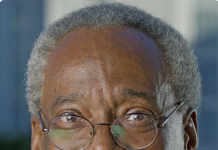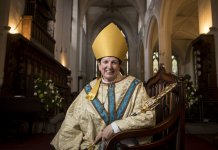The secretary general of the Anglican Communion, Bishop Anthony Poggo, on April 19 said that western cultural and governmental contexts are often responsible for the root cause of global migration, and this followed by hostility to migrants when they arrive in those countries. Poggo made his comments in a keynote lecture as part of the 2023 Albert T. Mollegen Forum at the Center for Anglican Communion Studies at Virginia Theological Seminary in Alexandria, Virginia.
“Any attempt to make change is likely to meet opposition – especially when it challenges vested interests,” he said. “When we participate in the work of God, we can expect even more opposition. What if we played our part in advocating for action on climate change, campaigning against war. Even our own individual contribution is important in not exacerbating the root causes of forced migration.”
Speaking about the United Kingdom government’s policy of deporting asylum seekers to Rwanda for processing – a policy that is currently held up by legal challenges – Poggo said that “the destination country of Rwanda is not the issue, the problem is the U.K.’s failure to recognize that it has its own share of the global responsibility.”
He said that the Archbishop of Canterbury had spoken against the policy in the House of Lords, the upper house of the U.K. Parliament, while “the Church in Rwanda understood the basic need for hospitality and did not find fault with the U.K. policy.”
He added, “This is a prime example of Anglican Christians, or the Anglican Communion, differing on their perspectives on a given issue.”
He also criticized the use of “quotas,” saying, “a migrant running away from insecurity or even danger does not care about these quotas.” He added, “These governmental quotas may themselves be fed by a narrative of fear. Yet as a church we can see beyond this and we should help alleviate these fear messages wherever we can.” But he also cited examples of positive approaches towards migrants and asylum seekers, including the 150,000 people in the United Kingdom who signed up to host Ukrainian refugees after the Russian invasion.
He also highlighted roles played by Anglican churches around the world, including in the United States, where The Episcopal Church has its own Migration Department which, he said, “gives me hope for change.”
Poggo – who has himself been displaced three times – said, “The church globally has been known for stepping into the gap where society fails. Despite so many different experiences and opinions, can we seek to find a way of holding differences together, to find a theology that shows how different responses form complementary parts of one body, as they tell good news stories about how Churches are responding to inspire the next generation of leaders.
“The Anglican Church of Canada has pledged refugee sponsorship since the 1970s. The Anglican Church of Cyprus has pledged to ‘welcome the stranger.’ The Church of Uganda has offered hospitality to approximately one million people from South Sudan. I could go on with further examples, but let me stay with Uganda for just a moment. After a decade of conflict in South Sudan, many Church leaders and bishops have crossed into the Province of Uganda. In 2017, one of the Ugandan bishops, in the Diocese of Madi & West Nile, authorized the South Sudanese displaced bishops to take care of the refugees within their own diocese and to be able to perform their episcopal ministry freely. Through this small act, he has created a home away from home for them, where they can carry on their ministry and calling.”
He added, “In other areas of the Communion, diaspora communities have been embraced and had a positive impact on the host community. The Diocese of Perth in Australia constructed a purpose-built Church in Malaga where they had a service in Bari and Dinka, two South Sudanese languages, where 150 people attend every Sunday, and more than 500 gather for special occasions. This is Anglicanism at its best.”
Responsibility was not just for governments and church structures, Poggo said, but also with individuals. “As Christians, of course we see the image and likeness of God in all people, this goes without saying. As Anglicans, we are called in our Marks of Mission to ‘respond to human need by loving service’ and to ‘transform unjust structures of society, to challenge violence of every kind and pursue peace and reconciliation.’ Personal hospitality is just as important as structural and governmental changes. The Bible encourages us to be hospitable and when this is our conviction, it influences our lives in all that we do. In Hebrews 13: 12, it says ‘Do not neglect to show hospitality to strangers, for by doing that some have entertained angels without knowing it’ (NRSV). Let us be a people that brings hospitality to this hostile world.”
Poggo will continue his visit to the United States over the next few days and will hold a number of meetings on the subject of migration and asylum.
He will also meet with the American Friends of the Episcopal Church of the Sudans. On Friday he will visit United Nations’ headquarters in New York to introduce the Anglican Communion’s new permanent representative to the U.N., Martha Jarvis.










